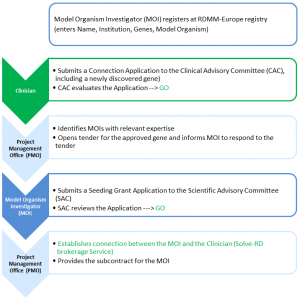About the network
The European Rare Disease Models & Mechanisms Network (RDMM-Europe) has been established by Solve-RD – an EU-funded research project including 22 beneficiaries and >20 associated partners. The overall aim is to boost research in rare diseases, discover new disease-causing genes and obtain evidence for pathogenicity through functional validation. The RDMM-Europe network will leverage the benefits from collaborations between model organism investigators and clinicians for rare disease patients.
Our publication “Model matchmaking via the Solve-RD Rare Disease Models & Mechanisms Network (RDMM-Europe)” has now been accepted for publication in Lab Animal:
Kornelia Ellwanger, Julie A. Brill [...] Olaf Riess. Model matchmaking via the Solve-RD Rare Disease Models & Mechanisms Network (RDMM-Europe). Lab Anim (NY). 2024 Jun 24. https://doi.org/10.1038/s41684-024-01395-2. Epub ahead of print.
How does it work?
Clinicians from a Solve-RD beneficiary or associated partner institution submit a Connection Application for a newly discovered disease gene, which they would like to be functionally validated. The Clinical Advisory Committee decides if there is enough clinical evidence and if that gene should be further analysed. The Solve-RD Project Management Office opens a call for tender for Seeding Grant Applications and starts searching for Model Organism Investigators (MOI) with the relevant expertise.
Model Organism Investigator will be invited to respond to the tender and to submit a Seeding Grant Application. The Scientific Advisory Committee (SAC) reviews the applications and decides who will receive the grant. The clinician who submitted the Connection Application will be asked to establish a connection with the selected Model Organism Investigator. Following a successful connection, the model organism lab will sign a subcontract in order to receive the Seeding Grant of 20,000 EUR to functionally validate the new disease gene.
The Clinical Advisory Committee (CAC) evaluates the submitted Connection Applications and approves genes which will be functionally validated. Committee members are:
- Olaf Riess (Solve-RD coordinator), University of Tübingen
- Rebecca Schüle (ERN-RND), University of Tübingen
- Nicoline Hoogerbrugge (ERN-GENTURIS), Radboud UMC, Nijmegen
- Teresinha Evangelista (ERN-EURO NMD), INSERM Institute of Myology, Paris
- Alain Verloes (ERN-ITHACA), Hôpital Robert DEBRE, Paris
- Eva Bermejo Sanchez (Spain UDP), Instituto de Salud Carlos III, Madrid
- Vincenzo Nigro (Telethon UDP), Telethon Institute of Genetics and Medicine, Pozzuoli
The Scientific Advisory Committee (SAC) reviews the submitted applications from the Model Organism Investigators and makes a selection of best matches to the Connection Application. Committee members are:
- Olaf Riess (Solve-RD coordinator), University of Tübingen
- Han Brunner (Solve-RD co-coordinator), Radboud UMC, Nijmegen
- Paul Lasko (RDMM-Canada), McGill University, Montreal
- Philippe Campeau (RDMM-Canada), University of Montreal

Statistics
Here is the statistics on the number of Connection Applications submitted to the Solve-RD brokerage service and the number of Seeding Grants awarded within the project.

